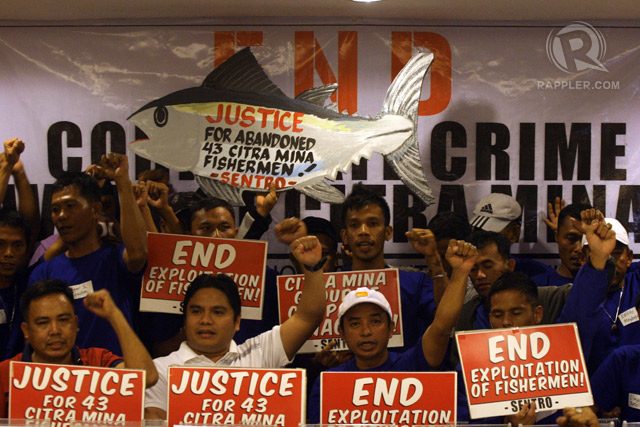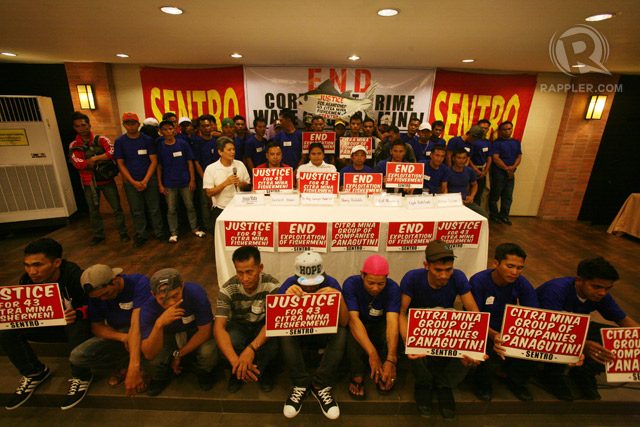SUMMARY
This is AI generated summarization, which may have errors. For context, always refer to the full article.

MANILA, Philippines – Tuna exporting giant Citra Mina denied it had any employer-employee relationship with the 43 fishermen and crew who were held in Indonesia for half a year and repatriated to the Philippines this week.
The company told Rappler that its supplier is the direct employer of the fishing crew.
On Thursday, February 6, the company’s spokersperson, former newspaper columnist Fred Lumba, told Rappler the Department of Foreign Affairs (DFA) should instead bill Citra Mina’s long-time supplier Felisa Abe for the return flights of the 43 fishers.
“Sa totoo lang, dahil wala ngang employer-employee relationship, wala kaming responsibility,” Lumba said. (The truth is, because there in no employer-employee relationship, we have no responsibility.)
DFA told the 43 workers in a dialogue that it would demand from Citra Mina payment for government expenses in their repatriation. The workers had identified Citra Mina owner Joaquin “Jake” Lu as their employer.
The money used to buy their plane tickets was sourced from the fund supposedly meant for the mandatory return of migrant Filipino workers in war-torn Libya.
Lumba acknowledged that DFA is the “primary rescuer” of the 43 workers who were apprehended by Indonesian authorities last August 26 and held for having no travel documents.
“Nakakahiya naman na hindi natin i-credit ang DFA for this (It’s a shame not to credit DFA for this),” he said, responding to claims by national labor center Sentro ng mga Nagkakaisa at Progresibong Manggagawa (Sentro) that it initiated the rescue campaign along with the International Union of Foodworkers and Allied Industry (IUF).
Sentro had alleged that Citra Mina knowingly sent an illegal fishing expedition and abandoned the 43 workers in the predominantly Muslim nation. They spent their Christmas and New Year in detention.

Supplier or dummy?
The workers were aboard the fishing boat Love Merben II, seized in Indonesia for allegedly having an expired fishing permit.
Lumba said Citra Mina’s supplier Felisa Ave is the registered owner of Love Merben II before the Maritime Industry Authority (Marina).
Sentro checked with Marina, and records yielded a Love Merben boat owned by Ave, but there was no Love Merben II registered.
Sentro secretary general Josua Mata had alleged that Ave was a mere dummy, with Citra Mina financing the boat’s operations and directly paying the workers.
Workers interviewed by Rappler upon their arrival last Monday corroborated this claim, saying their salaries are paid by Citra Mina and they deposit fishing stock to Citra Mina for salary advances.
READ RELATED ARTICLES:
But Lumba told Rappler the absence of the workers’ company IDs proves they were never employed by the company, which he said had been directly dealing only with Ave for 10 years now.
He added that Citra Mina merely provides down payment to Ave, which she uses to finance the boat’s crude oil and the food of the workers while on expedition.
This arrangement, Lumba added, is merely done to assist suppliers like Ave in their fishing operations.
‘Cabo’ system
Mata earlier alleged that Citra Mina employs an outdated and illegal hiring process called the “cabo” system.
The law defines a “cabo” as a person or group of persons in the guise of a labor organization that supplies workers to an employer either as an agent or independent contractor. A Department of Labor and Employment (DOLE) order is explicit in its prohibition.
Mata said workers are left with no job contracts under the “cabo” system, depriving them of workers’ protection under the law.
Citra Mina is the subject of a congressional hearing set for March 18 for its alleged labor law violations against its workers in canning factories.
Father Rey Ondap of a local parish in General Santos, where the company mainly operates, told Rappler these violations include unsafe conditions in its canning factories, lack of law-mandated workers’ benefits, and absence of compensation for occupational diseases, among others.
Lumba denied the accusations: “Citra Mina has a compliance certificate issued by DOLE. We abide by all labor laws issued by the DOLE, including minimum wage rules and regulations, PHilHealth, PAG-IBIG, SSS, etc.” – Rappler.com
Add a comment
How does this make you feel?
There are no comments yet. Add your comment to start the conversation.